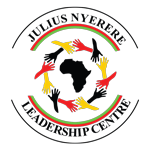JNLC and Konrad Adenauer Stiftung Release Book on the Form and Substance of the 2021 Elections in Uganda
In a landmark effort to document Uganda’s electoral history, the Julius Nyerere Leadership Centre (JNLC) at Makerere University, in collaboration with the Konrad Adenauer Stiftung (KAS), proudly launched a publication ‘Reviewing the Form and Substance of the 2021 Elections’. The launch, held on 5th February 2025 at the Makerere University School of Health Sciences Auditorium, brought together distinguished academics, policymakers, and civil society activists to reflect on Uganda’s electoral journey and its evolving democratic landscape. This comprehensive publication offers a critical analysis of the 2021 general elections, highlighting key events, challenges, and the broader implications for Uganda’s democracy.



The publication meticulously dissects the electoral process, shedding light on key themes such as the legal framework, electoral management, voter participation, security concerns, and media influence during the elections. It presents data-driven insights and well-researched perspectives on the conduct of political parties, the role of security forces, and the impact of digital technology in shaping electoral outcomes.
Keynote by the Minister of Justice and Constitutional Affairs
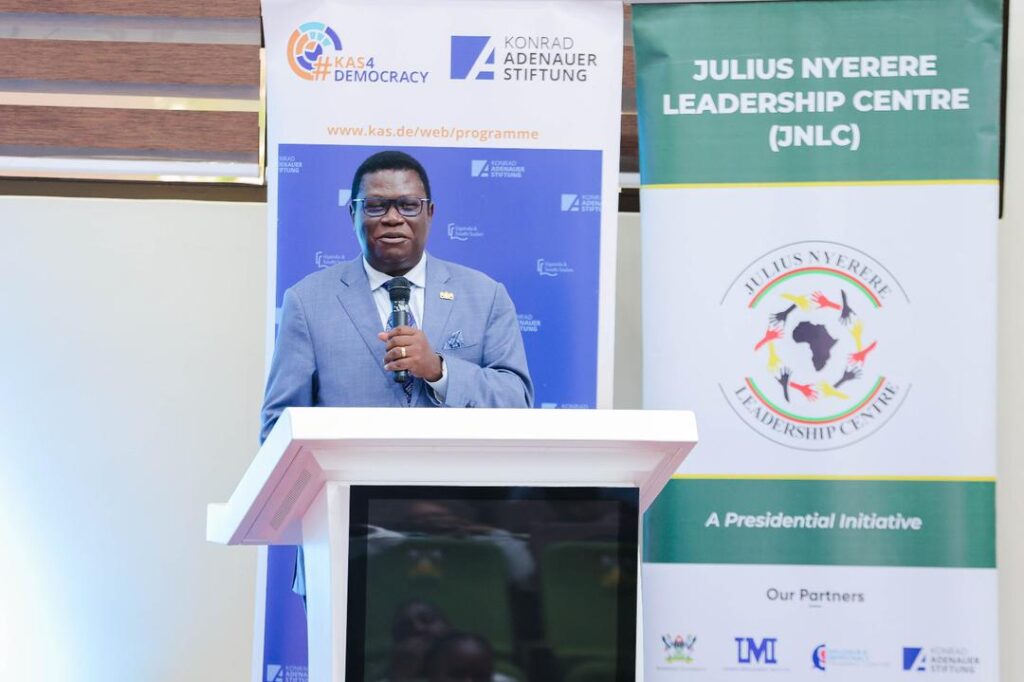
Hon. Norbert Mao, Uganda’s Minister of Justice and Constitutional Affairs
In his keynote address at the event, Hon. Norbert Mao, Uganda’s Minister of Justice and Constitutional Affairs noted that the publication was not merely a retrospective analysis, but a strategic blueprint offering valuable insights and lessons for the advancement of future electoral processes. “The 2021 elections were a defining moment in Uganda’s political landscape, exposing both progress and persistent challenges. This review serves as a guiding document to ensure that future elections are conducted with greater transparency, fairness, and inclusivity,” he said.
He emphasized the critical importance of electoral integrity, institutional reforms, and citizen participation in shaping Uganda’s democratic future. He stressed that electoral democracy should not be reduced to a mere event but should be recognized as an evolving process that demands continuous evaluation and reform. Hon. Mao argued that integrating technology into the electoral process could significantly mitigate common malpractices, such as ballot stuffing.
He revealed that he had consulted with technical experts at the Ministry, highlighting that the number of ballots counted must always align with the records securely stored in the electronic voting machines. “I believed that compulsory electronic voting would at least solve one major problem—ballot stuffing, which is a common electoral malpractice. My proposal, supported by technical experts at the Ministry, emphasized that the ballots counted must always match the records in the machine. To reinforce accountability, we even proposed a legal provision stating that any Presiding Officer overseeing a polling station where the votes counted from the ballot box exceed the machine’s recorded tally would face up to five years in jail and I was determined to push for legal reform. Unfortunately, my proposed law has yet to see the light of day,” the Minister said.
Hon. Mao urged Ugandans to rethink their approach to elections, emphasizing that the true power lies in the vigilance of the people, not solely in the Electoral Commission or government. “The elections are about the people,” he stated, highlighting that it is the responsibility of the citizens to ensure real substance in the electoral process. Drawing from his personal experience as both a candidate and a campaign manager, Hon. Mao noted that while candidates are allowed to campaign lawfully, the real challenge is how people align their votes with their interests.

He addressed the disconnection between the elites and the masses, urging a more humble acknowledgment of the political dynamics at play. He pointed out the paradox of the poor voting against their own interests, questioning why many sabotage their opportunities despite being the owners of resources like Uganda’s oil and minerals. In reference to a book titled Elite Parties, Poor Voters, Hon. Mao discussed the role of candidates and the government, suggesting that even with strong anti-corruption and anti-torture laws, the true issue lies not in the absence of legislation, but in the lack of a culture of genuine democratic commitment. He emphasized the importance of democracy in fostering development.
Remarks by the Executive Director of the JNLC
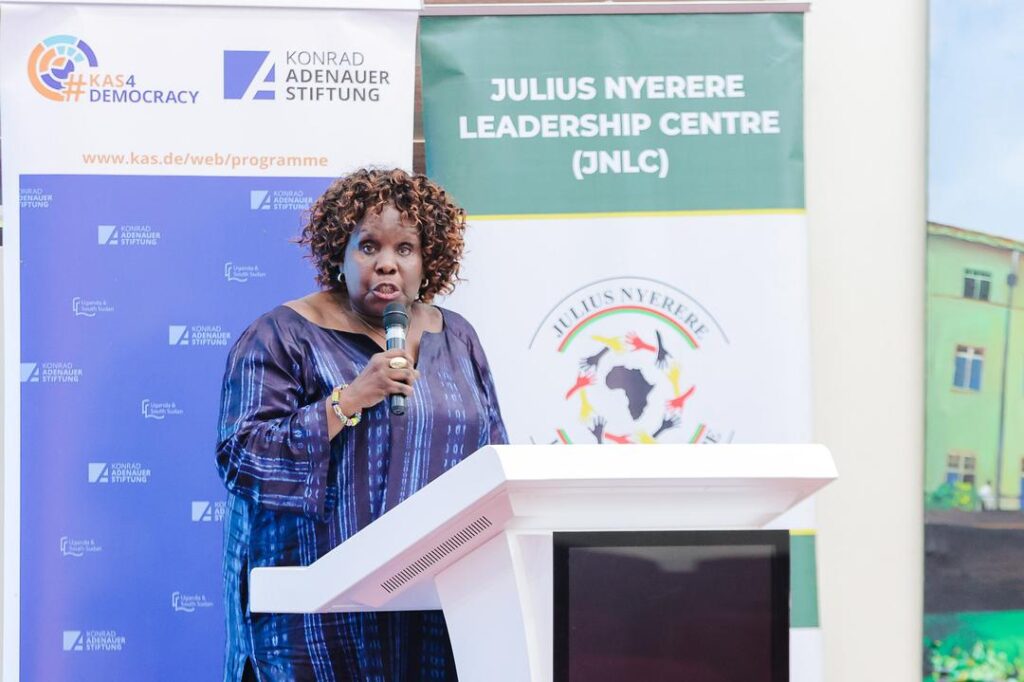
Dr. Suzie Nansozi Muwanga, Executive Director, Julius Nyerere Leadership Centre (JNLC)
Dr. Suzie Nansozi Muwanga, Executive Director, Julius Nyerere Leadership Centre (JNLC) underscored the depth of scholarship and critical analysis that went into this timely publication, which offers invaluable insights into Uganda’s electoral landscape and democratic trajectory. Dr. Nansozi acknowledged the passage of time since the 2021 elections but emphasized the significance of revisiting and scrutinizing their impact.
“It has taken some time since the book was completed before this actual launch. Nonetheless, I believe it is a timely publication, as it is the result of rigorous scholarship and thoughtful analysis by a distinguished group of academics, policymakers, and civil society activists. Their work offers an invaluable lens through which we can examine Uganda’s electoral landscape and democratic trajectory. While the elections may seem distant, their effects remain palpable, and the discussions would bring them vividly back to the present,” she noted.
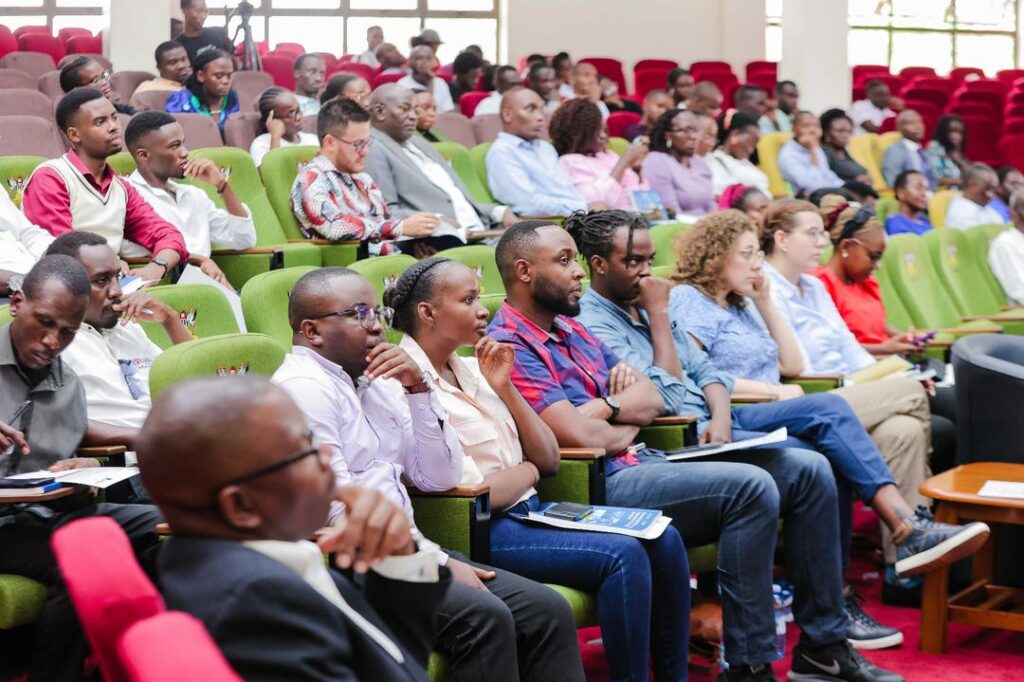
Dr. Nansozi delved into the key themes explored in the book, including the role of political parties, youth engagement and disengagement, gender considerations, electoral issues, and the role of civil society in ensuring democratic accountability. She particularly emphasized the increasing influence of Uganda’s youth in shaping the country’s political future, pointing out how their shifting allegiances—whether through active participation or disengagement—carry profound implications for governance and democratic development. “This book is a product of rigorous scholarship and thoughtful analysis. It examines the complexities of the electoral process, the shifting role of political parties, youth engagement, gender considerations, and the role of civil society in upholding democratic accountability. The book also explores voter behavior, internal party structures, and the urgent need for electoral reforms, stronger internal party structures, and enhanced civic engagement,” she explained.
According to Dr. Nansozi, the backdrop of the COVID-19 pandemic added another layer of complexity to the elections, affecting voter participation, campaign strategies, and electoral management. She thus stressed that these challenges reinforced the necessity of building resilient democratic institutions capable of withstanding crises.
Speaking on the Julius Nyerere Leadership Centre’s commitment to fostering critical discourse, Dr. Nansozi highlighted initiatives such as the East African Fellowship Program, which collaborates with partners in the East African Community to train and nurture the next generation of transformative leaders. She noted that the book embodies the Centre’s dedication to evidence-based research and policy engagement, both of which are crucial pillars for strengthening democracy and leadership across the continent.
Remarks by the Country Director, KAS
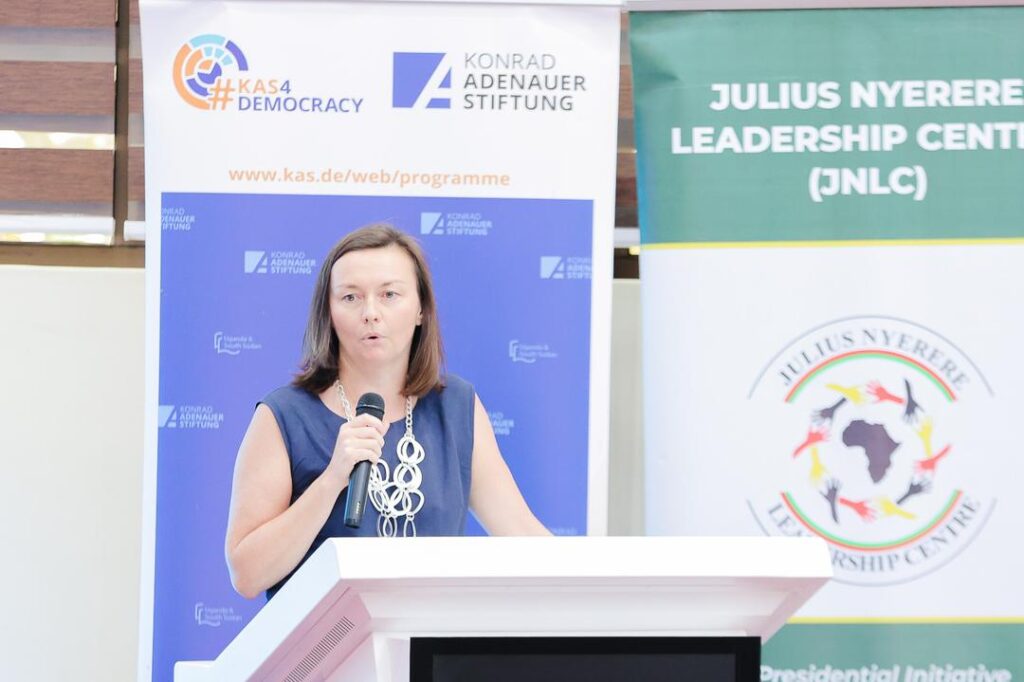
Ms. Anna Reismann, Country Director of KAS Uganda and South Sudan
Ms. Anna Reismann, Country Director of KAS Uganda and South Sudan, provided a personal reflection on the challenges surrounding the 2021 elections. Having arrived in Uganda just before the heated electoral campaign, she recalled witnessing firsthand the tensions, uncertainties, and institutional responses that shaped the elections.
She witnessed the quiet Kampala, likening it to a “ghost town.” Roadblocks, barricaded shops, and an exodus of residents painted a picture of anxiety rather than peace. Contrary to official narratives that labeled the elections as peaceful, she asserted that the calm was more of a reflection of tension and suppression than genuine electoral tranquility. “I remember driving through Kampala on the election day with my colleague, and the city felt like a ghost town—barricaded roads, closed shops, and an eerie calm. This book is crucial because it documents those critical moments, allowing us to analyze Uganda’s electoral process from multiple perspectives,” she stated.
She disclosed that it was against that backdrop that Dr. Nansozi, a key figure in the project, proposed the idea of compiling a comprehensive review of the 2021 elections. As a result, KAS immediately embraced the initiative, recognizing the importance of documenting and analyzing the electoral process from multiple perspectives.
A central theme in the publication is the debate over whether merely holding regular elections, regardless of procedural flaws, is sufficient to legitimize political systems and their winners. The book challenges the notion that electoral regularity alone equates to democratic legitimacy, prompting critical reflection on the deeper structural issues affecting Uganda’s electoral processes.


Ms. Reismann reaffirmed KAS’s unwavering commitment to democratic development, encapsulated in its mission to “shape democracy together.” She extended heartfelt appreciation to the Julius Nyerere Leadership Centre for their collaboration, as well as their relentless dedication to the project’s success. She emphasized that this book will serve as a valuable resource for scholars, policymakers, and all citizens keen on understanding Uganda’s evolving electoral landscape. “The publication stands as a testament to the importance of capturing historical moments and learning from them.”
Hon. Winnie Kiiza, former Leader of Opposition in Parliament
Hon. Winnie Kiiza, a prominent political figure and advocate for democratic reforms, called for urgent reforms in Uganda’s electoral process. She emphasized the need for a truly independent Electoral Commission, highlighting a critical flaw in the current system. She noted that while the Commission’s name was changed to the “Independent Electoral Commission” in alignment with court rulings, its independence remains compromised by the appointing authority, with some even holding leadership positions within political parties, undermining the commission’s impartiality.


“An independent Electoral Commission cannot be formed when it is made up of political party actors who are working to defend their respective parties. For the sake of a fair and transparent electoral process, the Commission must be free from partisan influences,” Hon. Kiiza asserted. She urged Parliament to prioritize electoral reforms that would ensure the Commission’s autonomy and integrity, emphasizing that failure to do so could erode public trust in the electoral system and pave the way for dangerous radical decisions. Hon. Kiiza also reflected on the impact of the COVID-19 pandemic on Uganda’s democratic processes. “During the 2021 elections, opposition candidates faced significant challenges due to stringent COVID-19 restrictions.” She pointed to media monopoly as a significant barrier to democracy, as opposition candidates were denied access to critical platforms to communicate with voters. Drawing on recent findings from the Afrobarometer report, Hon. Kiiza highlighted the growing dissatisfaction among Ugandans with the democratic process. “While many citizens still believe in the ideals of democracy, they are increasingly frustrated with the failure of elected officials to deliver on promises. Many voters are left with little choice, either voting for individuals they don’t know or accepting bribes in exchange for their vote,” she explained. This, she believes, undermines the essence of democratic participation and reinforces the need for urgent electoral reforms. Despite these challenges, Kiiza reaffirmed her belief in Uganda’s democratic potential. She called on fellow leaders and citizens to continue the fight for a truly independent Electoral Commission and to work towards ensuring that the Will of the people is respected.
Submission by Mr Lawrence Alionzi
Mr. Lawrence Alionzi, the 88th Guild President of Makerere University, shared his insights on the state of elections and governance in Uganda. Delving into the critical issue of citizen involvement in politics, he criticized the transactional nature of political engagement, where citizens are often reduced to mere tools to be “hired” for their votes.


He illustrated this with a striking example from his village, where a Member of Parliament gains popularity by participating in funerals and performing acts of physical labor, such as personally receiving a corpse. While this displays a level of compassion, Alionzi emphasized that such gestures should not be mistaken for the true role of a politician, which is to serve the public effectively and uphold democratic values. Mr. Alionzi raised concerns about the awareness of voters, particularly those in rural areas, who may not fully grasp the qualities they should expect in their elected representatives. This gap in political literacy, he argued, hinders the functioning of democracy. In an effort to highlight the importance of an informed electorate, Alionzi referenced the psychology-based game “Werewolves and Villagers.” In the game, the villagers represent the majority, while the werewolves are fewer but more informed. The game’s outcome demonstrates that those with knowledge will often outmaneuver those who lack it, no matter the numbers. This analogy underscored the urgent need for better civic education and awareness in Uganda. Mr. Lawrence Alionzi highlighted the need for greater political engagement, informed citizenship, and the importance of young people stepping up to lead. “As the country continues to grapple with the complexities of democratic processes, it is crucial that the youth become more involved in shaping the future of Uganda, ensuring that the spirit of democracy is not just an ideal, but a lived reality.”
Panel discussions
The launch of the publication provided an intriguing platform for thought-provoking discussions on the conduct, challenges, and implications of the 2021 elections. During the panel sessions moderated by Mr. Henry Kasacca, Executive Director, Dialogue and Democracy Training Centre and Mr. Samuel Muhindo, Programme Officer at KAS Uganda and South Sudan, the authors shared their insights with the guests, shedding light on critical aspects of the electoral process.
Prof. Sabiti Makara –Kabale University
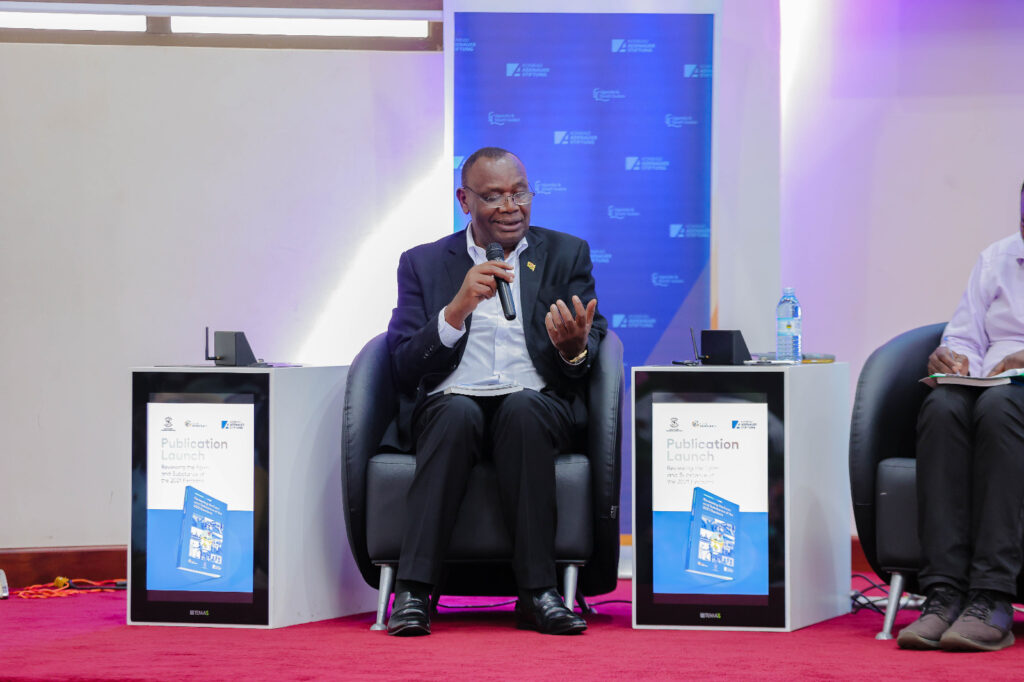
Prof. Sabiti Makara from Kabale University noted that the 2021 elections stood out as an unprecedented exercise, largely due to the unique constraints posed by the COVID-19 pandemic. The process, he explained, was characterized by three major concerns: The Role of the Electoral Commission (EC), election funding and the conduct of campaigns and voting procedures. He pointed out that the Electoral Commission appeared to operate under immense pressure, particularly from the executive which raised questions about the autonomy of the commission. He also noted that the health restrictions imposed due to COVID-19 added another layer of complexity to the elections. “The Electoral Commission, struggling to adapt to the pandemic conditions, proposed unconventional campaign methods, including virtual rallies and the use of large screens to broadcast campaign messages. However, these measures proved ineffective in ensuring equitable voter engagement, especially given the limited access to digital platforms in many parts of the country.” Reflecting on Uganda’s broader democratic trajectory, Prof. Makara emphasized that elections should serve as a vehicle for political stability and peaceful transitions. However, he expressed concerns that the 2021 elections exacerbated tension and deepened public skepticism about the country’s democratic institutions. He decried the erosion of democratic principles, questioning whether Uganda was headed for another cycle of political uncertainty rather than meaningful electoral progress.
The Impact of COVID19 on the 2021 elections – Dr. Julius Kiiza, Makerere University
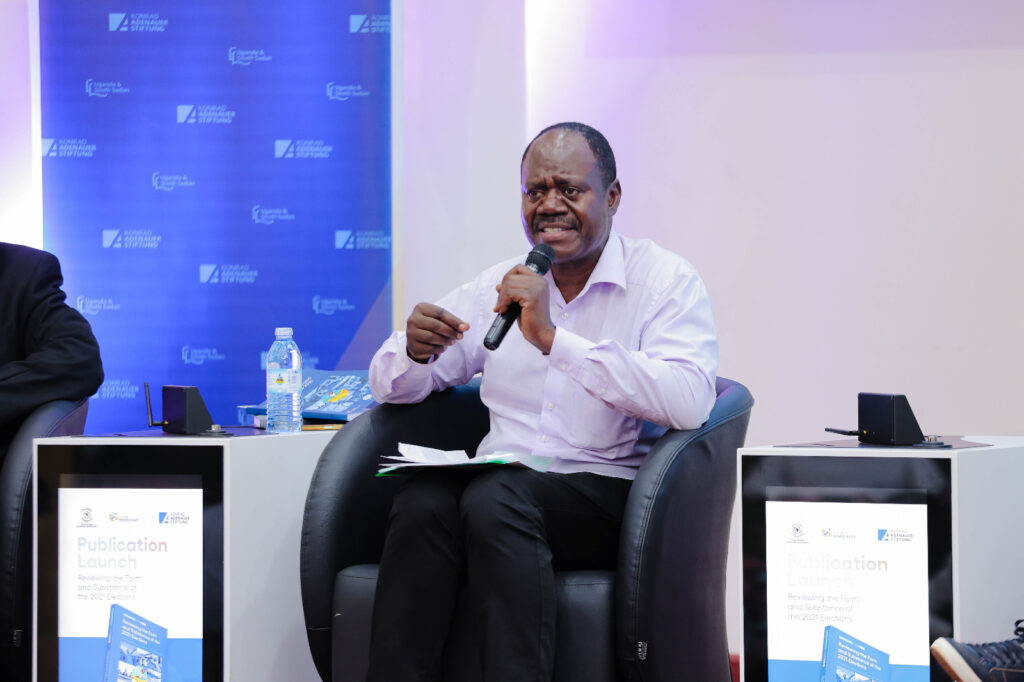
In his presentation, Dr. Julius Kiiza outlined three key propositions regarding the impact of COVID-19 on the 2021 elections: Restriction of Democratic Space, Transformation of the Ruling Party’s Governance Style and “Scientification” of Elections. He explained that the pandemic and the associated restrictive measures significantly curtailed democratic engagement, limiting political parties’ ability to campaign freely. According to him, the existential threat posed by COVID-19 led to the adoption of policies that consolidated state control over public and political life. Instead of fostering accountability, the measures reinforced authoritarian tendencies, further entrenching the ruling party’s dominance. He also explored the concept of “scientific elections,” a term used to describe the reliance on technology, media, and digital platforms for political campaigns. While this approach had potential benefits, it also raised serious concerns regarding accessibility. In his submission, Dr. Kiiza said that while COVID-19 necessitated adjustments to the electoral process, it also served as a tool for the ruling elite to reinforce their political dominance. According to him, the pandemic exposed the weaknesses of Uganda’s democratic institutions and thus highlighted the need for structural reforms to ensure greater electoral fairness in the future.
Mr. Eshban Kwesiga on “The Museveni Doctrine”
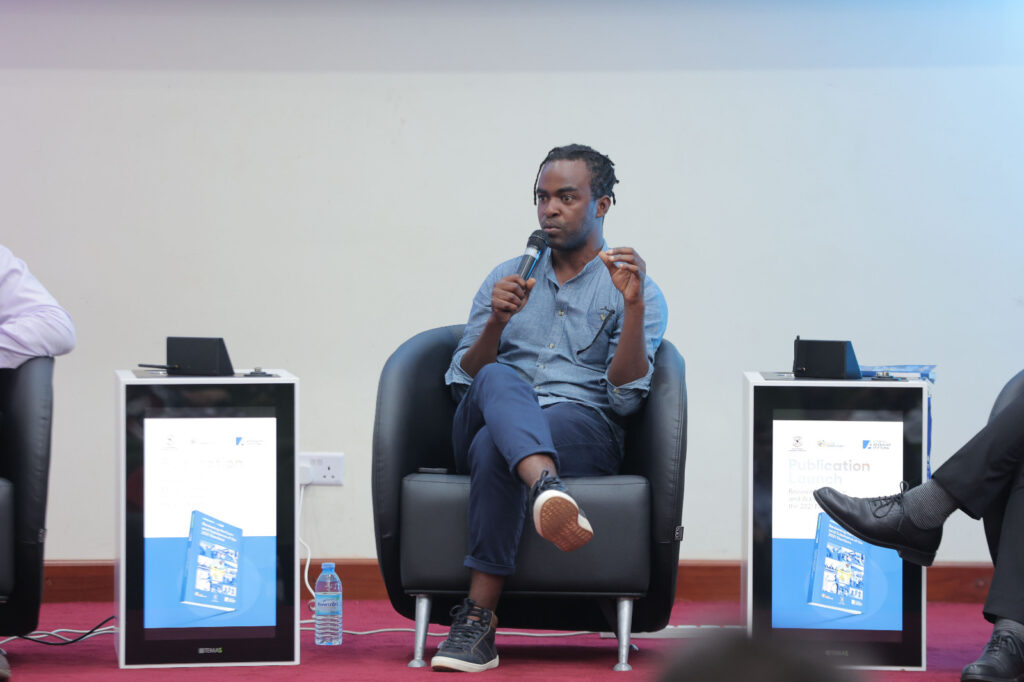
Basing his discussion on what he termed as “The Museveni Doctrine”, Mr. Eshban Kwesiga explored President Yoweri Museveni’s long-standing views on governance, the role of the military, and Uganda’s engagement with Western democratic ideals. Drawing from extensive research, including a review of over 300 pages of President Museveni’s speeches, Mr. Kwesiga outlined a framework of political thought that underpins the Ugandan leader’s philosophy of governance. One of the critical aspects of the Museveni Doctrine, as outlined by Mr. Kwesiga, is the deliberate politicization of the military, which ideology departs from conventional democratic norms, where the military is expected to remain neutral in governance. Kwesiga linked President Museveni’s governance philosophy to his university thesis on Frantz Fanon, whose work emphasized the role of violence in political organizing. Mr. Kwesiga stated that President Museveni’s inclination towards an alternative governance system, one where the military plays a central role, is therefore not an arbitrary approach but rather an extension of a deeply rooted ideological framework. Kwesiga said that the Ugandan leader has long harbored an alternative governance model that does not neatly fit into the categories of democracy or autocracy. Instead, it is a hybrid system where military participation in governance is not only tolerated but institutionalized.
The youth and political engagement
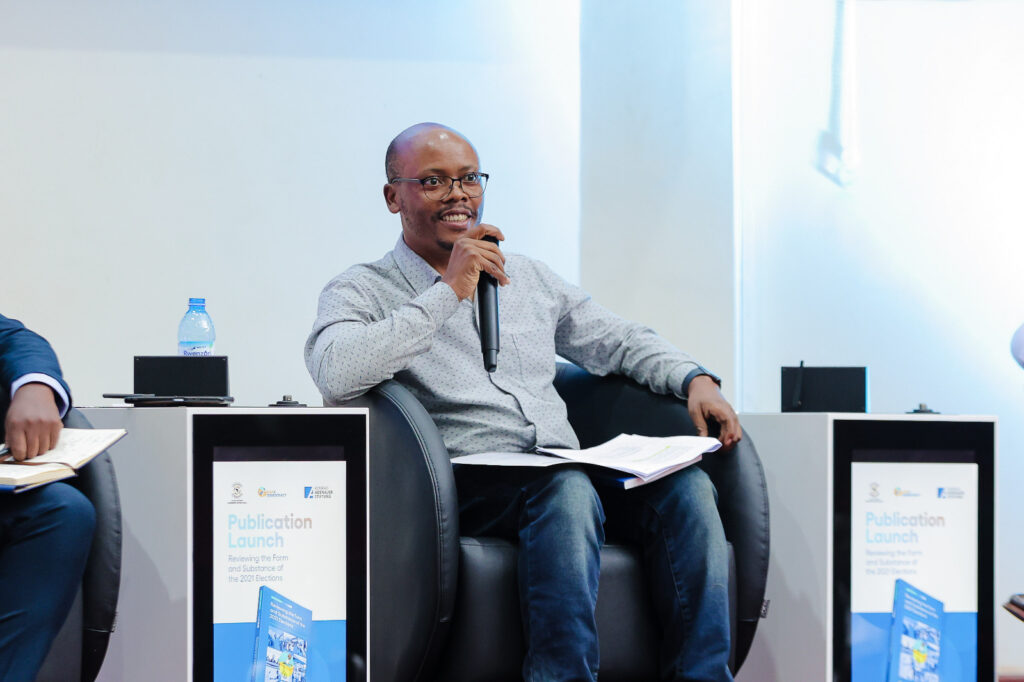
Dr. Badru Bukenya from the Department of Social Work and Social Administration at Makerere University presented an insightful discussion on the complexities of youth engagement and disengagement in Uganda’s political landscape by shedding light on the multiple dimensions of youth participation beyond just voting and highlighting critical factors that shape political change in the country. He noted that the youth often focus solely on voting, overlooking other significant forms of engagement. His paper sought to broaden this perspective by examining different types of youth political involvement and their impact, especially within Uganda’s semi-authoritarian system. He explained that amidst increased state violence, many young Ugandans resorted to digital engagement. However, online activism faced severe suppression as the government utilized legal frameworks such as the Computer Misuse Act to crackdown on dissenting voices. Another significant observation was the shift in transactional politics. While politicians have historically engaged in vote-buying, he said that young people had also learned to negotiate benefits in advance, aware that politicians often neglect their promises post-election. Dr. Bukenya explained that youth political engagement in Uganda remains fraught with risks.
The role of social media in shaping political engagement

Focusing on the role of social media in shaping political engagement during Uganda’s 2021 elections, highlighting both its potential and the challenges it presented, Dr. Solomon Winyii emphasized how social media provided a new way of attracting voters and engaging citizens. Unlike traditional forms of campaigning, he said that social media allowed people to access political content from their homes, including live campaign broadcasts, manifesto discussions, videos, and audio recordings. This accessibility shifted the nature of participation from passive observation to active engagement, even among individuals who were previously uninterested in politics. Mr. Winyi pointed out that social media’s influence on politics is not new, tracing its impact back to the 2008 Obama campaign, which demonstrated its ability to engage youth and create an alternative political space. In Uganda’s 2021 elections, social media platforms played a significant role in voter engagement and political mobilization, especially given the context of a scientific election due to the COVID-19 pandemic. One of the key findings highlighted by Dr. Winyii was the use of social media for political mobilization. However, this also came with manipulation, including the deployment of pseudo accounts. Mr. Winyii cited Facebook’s continued suspension in Uganda as a consequence of investigations revealing that the ruling regime had orchestrated an operation using fake accounts to influence public opinion. While manipulation was not limited to one side, the organized nature of these efforts led to significant restrictions on Facebook’s operations in Uganda. This issue raised broader concerns about who controls online political discourse and how social media regulation should be standardized globally. He also addressed the growing influence of digital media, with platforms such as YouTube emerging as more dominant than traditional television stations.
Identity politics and its implications for gender in Uganda’s political landscape

Delving into the topic of identity politics and its implications for gender in Uganda’s political landscape, Prof. Sarah Ssali explored how different identities shaped and were shaped by the 2021 electoral process. She challenged the traditional understanding of identity politics in Uganda, which has historically been framed around ethnicity. She explained that since the pre-colonial era, governance structures in Africa have often been organized along ethnic lines—a reality entrenched by colonial policies that institutionalized ethnicity as a means of control. Post-independence, Pan-African movements sought to transcend these divisions, yet identity politics remained a persistent feature of Uganda’s political discourse. “The 2021 elections, however, marked a departure from this conventional perspective. While ethnic sentiments—particularly allegations of Ganda-centric politics within the National Unity Platform (NUP)—played a role.” Prof. Ssali emphasized that other identity dimensions emerged as influential factors. These included gendered political identities, the youth vote, and, for the first time, the formal recognition of elderly citizens through dedicated political representation.
One of the key themes in Prof. Ssali’s analysis was the rise of socioeconomic identities as a significant force in the 2021 elections. The emergence of groups such as the Ghetto Youth and the NRM poor youth underscored how class dynamics influenced political engagement. Issues of landlessness, urban poverty, and economic marginalization became central to electoral mobilization, often overriding traditional ethnic affiliations. She thus noted that what appeared to be a Ganda-centric movement in Uganda could, in fact, be interpreted as a broader resistance against economic disenfranchisement. Land grabbing and urban dispossession, particularly in central Uganda, fueled political discontent, suggesting that socioeconomic grievances, rather than purely ethnic loyalties, shaped voter behavior.
Prof. Ssali also explored the generational aspect of political identity, particularly the concept of the Bazzukulu (grandchildren). Within this framework, she identified a distinction between law-abiding Bazzukulu and those perceived as rebellious elements, often associated with opposition movements and urban youth activism. The handling of COVID-19 restrictions, which disproportionately affected opposition gatherings, further reinforced these divisions, with government narratives framing certain groups as disorderly and others as compliant citizens.
The role of education in shaping electoral outcomes
A contentious point in the discussion was the role of education in shaping electoral outcomes. Some panelists argued that the concentration of educated elites in urban centres influenced voting patterns, particularly in Kampala, where opposition support was strong. Prof. Ssali, however, challenged this view, cautioning against a colonial-era mentality that positioned urban centres as the heart of economic and political activity while treating rural areas as peripheral. She argued for an intersectional approach to political analysis, where multiple factors—including socioeconomic status, land ownership, and generational divides—interact to shape political behavior. This perspective moves beyond simplistic dichotomies and provides a more nuanced understanding of Uganda’s evolving political landscape.









Appreciation
In her closing remarks, Ms. Anna Reismann expressed gratitude to all the authors who undertook the critical task of scrutinizing Uganda’s electoral process. She said the book not only explores the unique aspects of the 2021 elections but also facilitates comparative analysis with global electoral trends. In the same spirit, Dr. Nansozi extended her heartfelt gratitude to the distinguished researchers and contributors to the publication for their unwavering commitment, patience, and scholarship which were instrumental in bringing the project to fruition. She paid special tribute to the Konrad Adenauer Stiftung (KAS) for their steadfast support in making this publication a reality.

